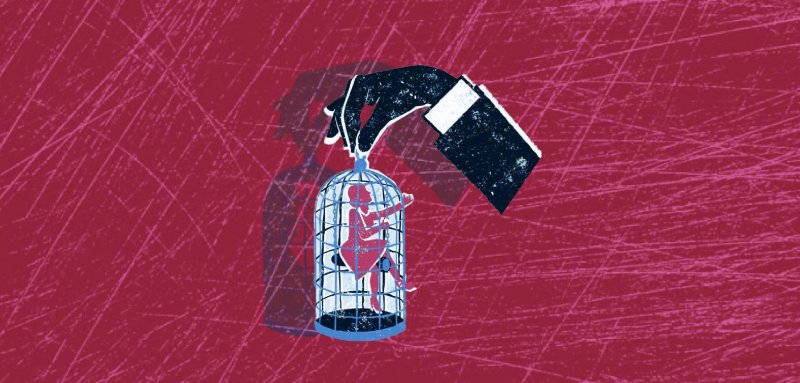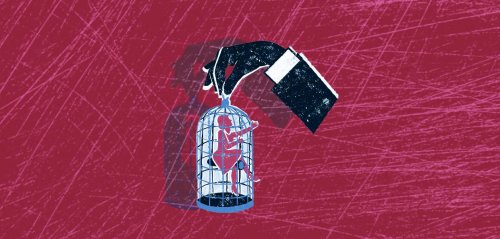Life conditions in Gaza are deteriorating owing as the Strip has been experiencing, since the beginning of the Second Intifada in 2001, a setback on both the human and economic fronts. This reality has been accompanied with a lack in job opportunities for young people and breadwinners. As a result, the cycle of life was affected.
Over two decades, social and economic life in Gaza have been unstable and have had cumulative effects, the fact lead to the end of Fatah’s control over the strip. In fact, the rampant insecurity that included incidents of murder and assassination between Fatah and Hamas and bloody battles that followed in 2007 have caused Hamas to take control over the Strip.
During Hamas’ rule, the Gazan people had fought five battles, from 2008 until 2021, that caused the death of thousands, increased the number of widows and orphans, and left people with hundreds of disabilities and amputations, impacting their ability to work.
During this gradual increase in violence, the rate of extreme poverty had increased among individuals, according to the monthly consumption patterns, and had reached 33% until the latest statistics of the Palestinian Central Bureau of Statistics in 2017. This rate might be even higher now.
The rate of working women in Gaza has escalated because of the multiple circumstances that had left fathers unemployed and children with no money. Despite the hard conditions in which women have been living during the last decades, the conservative families and their reticence about women’s employment and owing to the increasing rate of women’s education, women have been able to find more space in the labor market. The percentage of women head of households is 25% from 7% in 2005.
According to the Palestinian Central Bureau of Statistics in 2019, the rate of Gazan women participating in the labor market was 30%, the highest rate reached by women. However, the work of these women had opened the door to a new form of suffering: it had not made them freer but in many cases, more submissive and humiliated.
Violence and bullying
“My father has agreed to my work after I had promised to pay him half of my salary under the pretext that his income is not enough,” said T.C. who works in a big Gazan company in the accounting field and who was reticent about mentioning her name for fear of reprisal.
"I used to give my dad half my salary and live off a small amount until the end of the month. I had to buy clothes for work and pay the transportation fees, the money was never enough, I even had to borrow from friends"
The 20-year-old woman continues: “I used to give my dad half my salary and live off a small amount until the end of the month. I had to buy clothes that suit my work and pay the transportation fees, but the money was never enough and I was always forced to borrow from friends.”
Once she had objected to the amount paid and tried to decrease it, the young woman was subject to violence and bullying by her father. “Open your mouth, and I will throw you out into the streets,” he replied.
She adds: “I have a young disabled brother and I have wished to be by his side. However, my father beats me and pushes me with his hands once I tell him so. He says: “We won’t be able to change what God has destined.”
Regarding the living conditions, she says: “I have not felt that my family’s living condition has improved despite my regular payments to my dad. I was always apprehensive about money matters. My father has always complained and life has always been hard.”
She continues: “After two years of exhaustion, enduring hardship, and paying half of my salary to my father, I was, one day, surprised that he wanted to marry our neighbor under the pretext that my mother was unable to fulfil his desires. I was the provider of the new bride’s expenses.”
When asked about the reason she is crying, the young woman responded: “Excuse my tears. I am not able to cry in front of any family, because they will tell my father that I did so. I will be subject to a pointless investigation, will not be able to tell him that he is the reason and will have to justify to stop him from doubting me and accusing me of being a bad daughter.”
I lost a third of my weight
After realizing that the labor market in Gaza is saturated and that there is no room for new opportunities, Hana, 29 years old, joined online workers and excelled, for years, in designing websites but she soon faced a bigger problem.
She says to Raseef22: “My work is very hard and requires me to stay up till dawn working. I then have to complete home tasks in the morning, I lost one-third of my weight. My husband works on and off in Gaza, years after he had stopped due to occupation and limited ability to commute. Therefore, I had to work to provide for my home.
When this home’s breadwinner became a woman, the toxic masculinity started. The husband went on to ask his wife for money in order to give his family: three unemployed brothers, his father and his mother.
I had hoped to live a normal life with no crises. However, my husband severely beat me when I was 6 months pregnant, because I had refused to give his parents money. As a result, I gave birth to a visually impaired girl.
Hana adds: “I had hoped to live a normal life with no crises. However, my husband severely beat me when I was 6 months pregnant, because I had refused to give his parents money. As a result, I gave birth to a visually impaired girl.”
She finishes off by saying: “All I dream about now is my daughter’s treatment. I cry every day seeing her grow up before my eyes with disability.”
A mysterious future
Suhad, 36 years old, sells pastries and food online. She sought this job to help her husband whose debts exhausted him after he had built an apartment in his family's building. She had asked him to do so, because the room in which they used to live in with his parents was not enough to fit a couple with five children.
She says to Raseef22: “After the construction, my husband became so nervous. Every time he accuses me of being the reason of his misery and misfortune using the ugliest words.”
She adds: “After I started working, my husband became dependent on my income and started to complain about the idea of working.” The husband leaves for his work as a driver after 12 p.m. Whenever she asks him to work to pay off the debts, he responds: “You have caused all of this poverty and you will have to take full responsibility.”
Suhad continues: “What I sell online is barely enough to fulfil the children’s needs. I am so sad for them because of their uncertain future and our ability to meet the minimum of their requirements.”
The 36-year-old woman adds: “If I had known this would be my destiny, I would not have gotten married. We, women, have come to live in a patriarchal society that pressures us to work and support our families. Many young men in Gaza are unable to adapt to the hard circumstances.”
Lastly, she says: “I do not think of getting a divorce, because its consequences are extremely serious. If I ever choose to return to my father’s house, I will then have to fight a social war from a different kind: one that is full of oppression, interdiction, bullying, doubt, and honor impugnation.”
For many years but intermittently, women in Gaza have fought different kinds of wars. However, they are engaged in a permanent social war with male domination that has its ancient origins as sacred inscriptions. Those who deviate from them, fall into the swamp of oddity and incomprehension. In such patriarchal societies, there is no space for anything except for male domination that underlies the continuous production of female victims.
Raseef22 is a not for profit entity. Our focus is on quality journalism. Every contribution to the NasRaseef membership goes directly towards journalism production. We stand independent, not accepting corporate sponsorships, sponsored content or political funding.
Support our mission to keep Raseef22 available to all readers by clicking here!
Interested in writing with us? Check our pitch process here!






